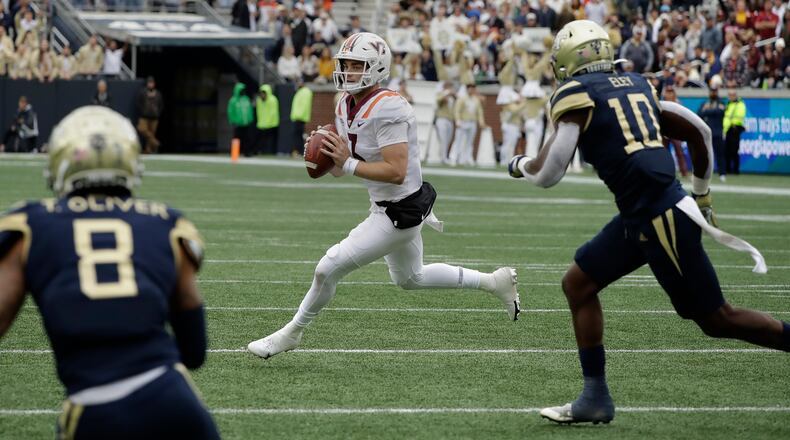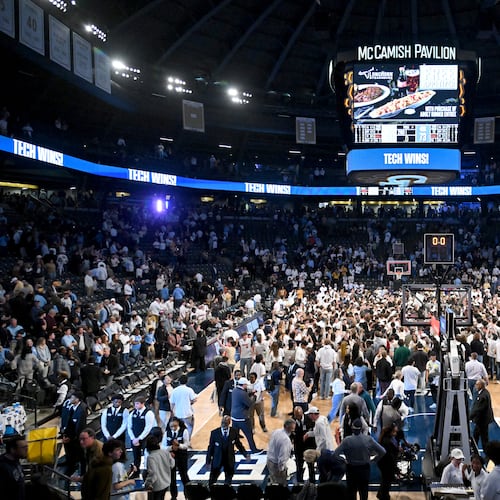Georgia Tech and Virginia Tech meet for one final time as Coastal Division rivals Saturday in Blacksburg, Va., and the circumstances are a little different than they once were in this series.
For years, this matchup was one of the premier rivalries in the ACC and arguably the most meaningful. Between 2005 – the first year that the conference went to a two-division format – and 2012, the Coastal’s representative in the ACC title game was either Virginia Tech (five times) or Georgia Tech (three times).
When the Yellow Jackets and Hokies clash in the final year of the conference’s 17-year chapter with two divisions (excepting the 2020 season, played with one division), the Hokies (2-6, 1-4 ACC) are trying to stop a five-game losing streak and avoid a loss that would knock them out of bowl contention. The Jackets (3-5, 2-3) are trying to salvage a season that has already witnessed the dismissal of coach Geoff Collins.
“It obviously could have gone out in a totally different way,” said ACC Network announcer Wes Durham, for 18 memorable years the Georgia Tech radio voice and a narrator of this drama-filled rivalry. “But these, for the most part, were the kings of the division since divisions were created.”
Reached Friday, Durham did not need much prompting to recall the past meaning of the Georgia Tech-Virginia Tech series. Between 2005 and 2011, the winner of the Tech-Tech game went on to win the Coastal. It had no shortage of drama.
“I remember we went up there and won the game (in 2006) with Calvin Johnson,” Durham said. “Gary Guyton ran the fumble back. We went from that to playing the unbelievable game in ‘09. And, actually, the ‘08 game is unbelievable, too, when you think about it.”
From 2008-18, former Jackets coach Paul Johnson and Hokies defensive coordinator Bud Foster engaged in chess matches pitting their players and schemes. Georgia Tech suffered through four consecutive wrenching losses to Virginia Tech from 2010-13 before breaking through with a fourth-quarter comeback in Blacksburg in 2014. In the 15 meetings from 2004 – the year Virginia Tech joined the ACC – through 2018, either one or both teams were ranked 10 times.
The rivalry inspired the passions of both sides. The last time the goalposts at Bobby Dodd Stadium came down was after the Jackets’ 28-23 win over Virginia Tech, in 2009.
“I know it’s been a good game for Virginia Tech fans,” Durham said. “I know it’s been a good game for Georgia Tech fans.”
The games were hard-hitting, competitive and compelling, and TV executives noticed. In the 2004-18 span, the two teams played on ESPN’s main network nine times. It was on ABC three more times. On eight occasions, ESPN executives picked out the Tech-Tech game to play on either Thursday night or on the unique Labor Day night stage (2012).
Against that history, the Jackets and Hokies play one final time as competitors in the Coastal, a division that more than held its own during their run at the top. But, as they’ve descended, the division has, too. From 2007-10, Virginia Tech won the ACC title three times and Georgia Tech once (in 2009, since vacated). From 2011 through 2019, either Florida State or Clemson won the league out of the Atlantic as the balance shifted. Last year, Pitt became the first Coastal team to win the league since Virginia Tech in 2010.
For the second year in a row, both teams go into the game with losing records. Virginia Tech is on its second coach, Brent Pry, since the legendary Frank Beamer retired after the 2015 season. Georgia Tech is not long behind, having dismissed Collins and now is in a search for his successor. ESPN and its family of networks passed on Saturday’s game, as it did the previous two. It will be on regional sports networks, including Bally Sports South in Atlanta.
“It just kind of shows you that the cycle really does exist in this sport,” Durham said. “It just doesn’t happen in a four-year window.”
As they’re not partners in the new scheduling model, the two teams will not meet again until 2024, in Blacksburg, and then in 2026 at Bobby Dodd Stadium.
“Here’s Virginia Tech, they’ve already made their change,” Durham said. “Georgia Tech is making their change, and both are trying to get back to what they had in the mid-2000′s.”
About the Author
Keep Reading
The Latest
Featured



